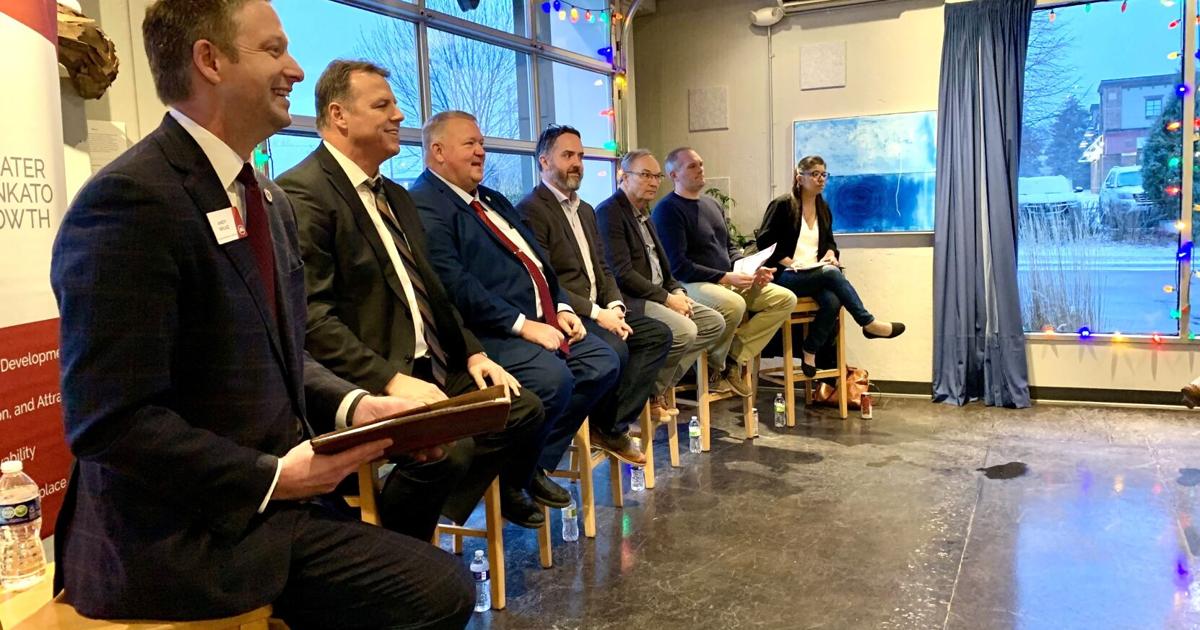MANKATO — Surrounded by holiday lights and food for a different feel to a political forum, local lawmakers joined moderator Andy Wilke, the executive vice president of Greater Mankato Growth, at LocAle Brewing Company Tuesday for discussion on the upcoming session.
With November forecast numbers now out — projecting a $616 million surplus for the next biennium but a potential $5 billion deficit in the coming years — and an upcoming even split in the House, the budget and bipartisanship were common themes of the evening.
Wilke kicked off the conversation with DFL Sen. Nick Frentz, of North Mankato; Republican Sen. Rich Draheim, of Madison Lake; DFL Rep. Luke Frederick, of Mankato; Republican Rep. Paul Torkelson, of Hanska; Republican Rep. Bjorn Olson, of Fairmont; and Republican Rep.-elect Erica Schwartz, of Nicollet, by asking about their priorities, with Frentz taking the first swing.
“What I say our priorities should be this session are two things: budget restraint and hopefully a little more bipartisanship,” he said.
“Where I take that from is I think the voters. I thought that was the message that we got not only locally but nationally.”
Draheim began his answer saying he and his colleagues will need to consider cuts in the budget.
“We really need to look at a lot of the new programs that we implemented… That’s why we have that big cliff coming,” he said. “It’s going to be a team effort to get the budget lined up for the second biennium.”
Frederick agreed that lawmakers need to exercise restraint but noted that federal policies such as tariffs could also have an impact on the forecast.
Olson tied in the budget discussion with how it impacts taxpayers.
“There’s no more juice to squeeze out of the Minnesota taxpayer,” he said. “It’s time for the state of Minnesota to take their belt and tighten it one more notch.”
Wilke then asked how lawmakers expect the session to go with a 67-67 split among Democrats and Republicans in the House.
Frederick noted how Republicans and Democrats who have worked together in the past will see those efforts pay off this year.
“It is in everybody’s interest that we do work together,” he said.
Torkelson added that nothing is going to get out of committee without bipartisan support while Schwartz said what they know for sure is that a tie will force them to compromise.
“We’re going to take waste and fraud seriously and invest in Minnesotans,” she said.
On the Senate side, Draheim said their work won’t be much different but they’ll have to take deadlines seriously.
“I think timing is the most important part,” he said.
Frentz also gave his two cents.
“That’s the great thing about democracy is that it does go back and forth… you are our boss and you have the right to fire us,” he told the audience.
Tuesday’s forum was well attended with community members, business stakeholders, local leaders and others.
One audience member asked whether or not there would be a chance for a smaller bonding bill this year after lawmakers didn’t pass one last session.
Frederick said he will be advocating for a bonding bill this year.
Draheim said clean drinking water should be a priority if a bill is brought to the table, adding that basic projects are most important.
“Then I’m ok with a bonding bill, but I have not seen that, and that’s the problem,” he said.
Frentz called on lawmakers to support a standalone bill and said it would show Minnesotans they can work together.
GMG’s 2025 policy priorities this year include reducing tax burdens, the local business climate, workplace mandates, workforce housing, health care, child care and more.
Tuesday’s discussion also included time talking about the impact policies like earned sick and safe time have on small businesses.
Community members Paula Humbard and Erin Berle, who work in the disability services industry, were among the forum’s attendees.
Humbard said she liked an idea brought up during the forum about auditing different agencies and departments during the budget process.
“I think that’s a great plan. If you want to cut, that’s the way to cut is you audit it and you’re like oh, well maybe this agency we’re putting money into it and it isn’t doing anything. I’m sure there’s some of those out there,” she said.
The session begins Jan. 14.


